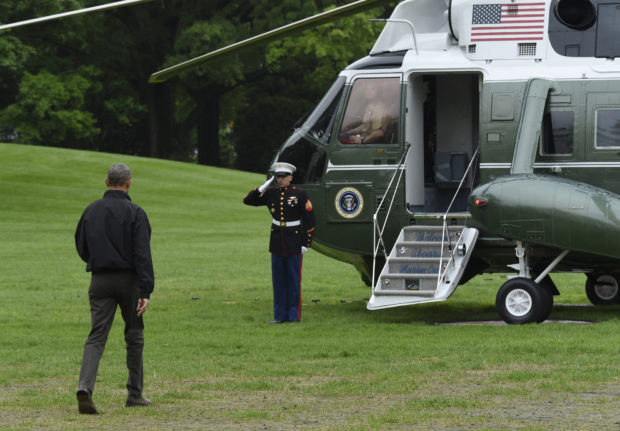Obama departs on trip to Vietnam, Japan

President Barack Obama heads to Marine One on the South Lawn of the White House in Washington, Saturday, May 21, 2016. Obama is leaving on a weeklong, 16,000-mile trip to Asia as part of his effort to pay more attention to the region and boost economic and security cooperation. AP Photo
ANDREWS AIR FORCE BASE, United States—Barack Obama departed Saturday on a trip to Vietnam and Japan that will include the first visit to Hiroshima, site of the world’s first nuclear attack, by a sitting US president.
Obama left at 1:20 p.m. (1720 GMT) aboard Air Force One on the first leg of the trip, which ends with a refueling stop at Elmendrf Air Force Base in Anchorage, Alaska.
The president’s tenth trip to Asia aims in part to close painful chapters on two 20th century wars in a region he sees as vital to America’s future.
It begins in Hanoi, where Obama will stress improving relations with a dynamic and rapidly emerging country, but one which, for most Americans, remains a by-word for slaughter and folly.
A major talking point will be the lifting of a US arms embargo, a last vestige of a war that ended in 1975.
Article continues after this advertisementHe will meet the president, prime minister, leader of the national assembly and the country’s de facto leader Nguyen Phu Trong, the general secretary of the Communist Party.
Article continues after this advertisementTrong and Obama met last July, when the Vietnamese leader was given a prestigious Oval Office meeting.
Arms embargo
Tense maritime disputes between Vietnam and its larger neighbor China are also likely to feature prominently in discussions.
Advocates of lifting the arms embargo argue it is vital to helping Vietnam improve coastal defenses and bolster it militarily against Beijing.
“Vietnam wants and needs to steadily pursue military modernization, and it values US military technology as a potential source of strategic leverage,” said Murray Hiebert of the Center for Strategic and International Studies.
“Not only does Vietnam need to build an effective deterrent force in the face of China’s aggressiveness … it also prefers to gradually reduce its over-reliance on Russian-made systems.”
But weighing against it are concerns about Communist-ruled Vietnam’s human rights record.
US diplomats have pressed for the release of political prisoners as a sign that Hanoi can be trusted with advanced weaponry.
Obama is likely to address the issue of political freedoms when he delivers a speech in Hanoi, but he will also make the case for a trans-Pacific trade deal that faces an uncertain future.
Obama will also travel to Vietnam’s economic hub Ho Chi Minh City, the former capital of South Vietnam, to highlight the country’s growing commercial clout.
Hiroshima
In Japan, Obama will attend a G7 summit and make history by becoming the first sitting US president to visit Hiroshima, where in 1945 then-president Harry Truman dropped the world’s first atomic bomb.
The trip to Hiroshima has inevitably stirred debate about whether Truman’s epoch-making decision was just.
Many Americans believe that while it killed about 140,000 Japanese, bombing Hiroshima and then Nagasaki avoided an even bloodier ground invasion of Japan.
Victims of the bombings have called for an apology, which the White House says it is not willing to give.
Obama “believes it’s important to acknowledge history, it’s important to look squarely at history, it’s important to have a dialogue about history,” said close Obama foreign policy aide Ben Rhodes.